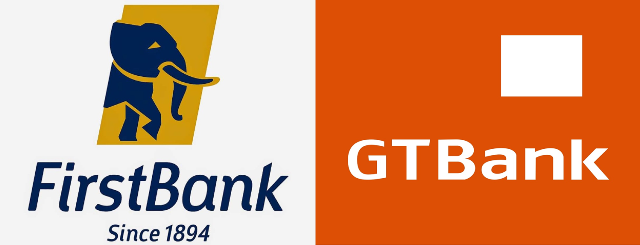The Bank of Ghana has suspended the foreign exchange trading licences of two Nigerian-owned banks – Guaranty Trust Bank Ghana Limited and FBNBank Ghana Limited.
The bank explained that the suspension became necessary after it noticed various breaches of foreign exchange market regulations which include incidents of fraudulent documentation within their foreign exchange operations.
The suspension is reflective of the banks’ underhand financial deals, even back in Nigeria.
Recall that First Bank, for instance, was in 2023 enmeshed in a scandal involving the disappearance of N68 million from Italy-based female customer’s account.
GTB, on the other hand, was embroiled in a tussle with Innoson Nigeria Limited which went to a Federal High Court in Enugu to stop the bank from changing its legal status from a public limited liability company until it pays over N32 billion allegedly owed Innoson.
In the suit marked FHC/EN/CS/161/2020, the company sought an order of perpetual injunction restraining the CAC from deregistering the GTB as a public limited liability company and or re-registering the bank as a private limited liability until GTB pays the company outstanding judgment debt of N32, 875, 204, 984.38k arising from Suit Nos: FHC/L/CS/603/2006 and No. FHC/AWK/CS/139/2012 respectively affirmed by appellate courts.
Therefore, the latest development which has earned them a sanction in Ghana is the case of a leopard that would never change its spots.
The Bank of Ghana which announced the suspension in a statement on Monday, March 4 said the punishment takes effect from March 18, 2024, for one month.
“Bank of Ghana has suspended the foreign exchange trading licences of Guaranty Trust Bank Ghana Limited (GTB) and FBNBank Ghana Limited (FBN), effective 18th March 2024, for a period of one month, in accordance with Section 11 (2) of the Foreign Exchange Act 2006, (Act 723).
“This is as a result of various breaches of the foreign exchange market regulations, including fraudulent documentation in their foreign exchange operations which have come to the attention of the Bank of Ghana.
“The licence will be restored at the end of the one-month suspension period once the Bank of Ghana is satisfied that they have put in place effective controls to ensure strict adherence to regulations to the foreign exchange market,” the statement said.
It stated that the action was taken in strict accordance with Section 11 (2) of the Foreign Exchange Act 2006, (Act 723), underscoring the Bank of Ghana’s commitment to maintaining the integrity and stability of the foreign exchange market.
“The suspension serves as a direct consequence of the banks’ failure to comply with established regulations, highlighting the central bank’s zero-tolerance policy towards regulatory non-compliance,” the statement added.





























































